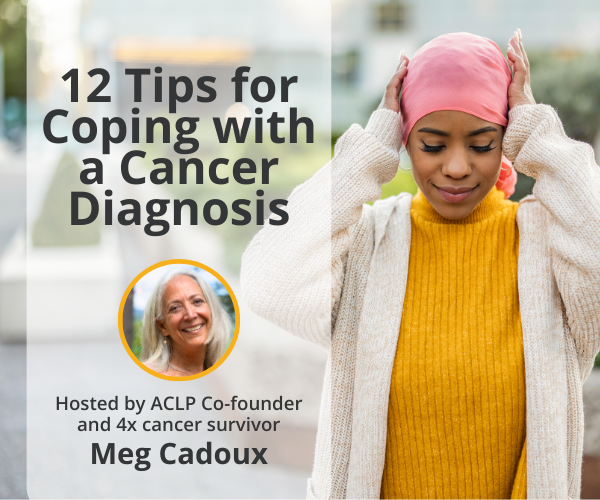12 Tips for Coping with a Cancer Diagnosis

Watch the replay
Like many of our participants, ACLP co-founder Meg Cadoux has heard a doctor say the words: “You have cancer.” Three times, actually.
During this session, Meg will share her 12 “Rules of the Road” for how to handle a cancer diagnosis, both emotionally and practically. She will answer your questions and look forward to hearing your insights and practical wisdom about how to stay focused and centered when the world comes crashing down around you.
Additional resources
- Apply for Spring 2026 Learning Circles
- Meg’s Blog Post: 12 Tips for Navigating a Cancer Diagnosis
- Breast Cancer Helpline: Reach out at (888) 753-LBBC (5222) to connect one-on-one with someone who has been there.
- CaringBridge: A personal health journal, rallying friends and family during any type of health journey
- Cancer Caregiver Support: Find out what to expect if you become a caregiver for a person with cancer, and get tips for making sure that you take care of yourself as well.
- During treatment, try to keep moving physically, no matter what. It might just be chair yoga. We have a video for that.
- The Wheel of Life allows you to visually see where you are putting your time and energy as contrasted to where you WANT to put your time and energy.
- INFOGRAPHIC: Tai Chi and Qigong – Healing Benefits for Cancer Patients & Caregivers
- Anticancer Living book by Dr. Lorenzo Cohen
- Our Mindset instructor, Margaret Fletcher, runs Mindfulness-Based Stress Reduction courses online.
- Book: Anticancer, a New Way of Life by David Servan-Schreiber
- List of vetted mental health professionals from Psychology Today
- Between Two Kingdoms by Suleika Jaouad


